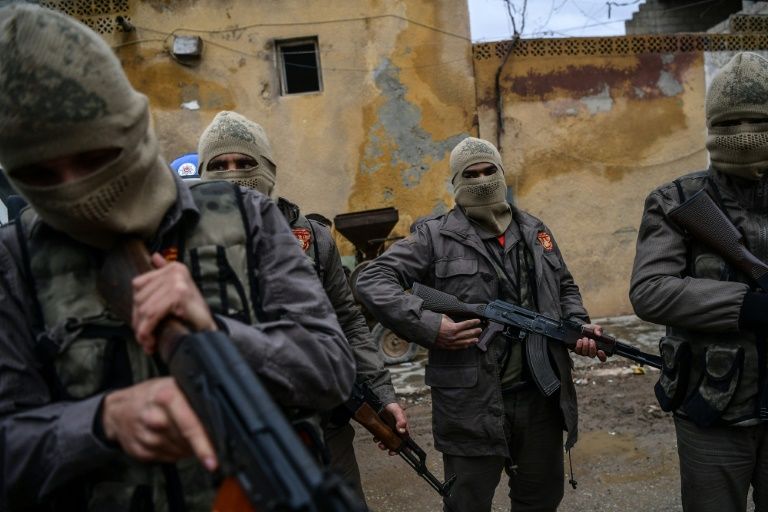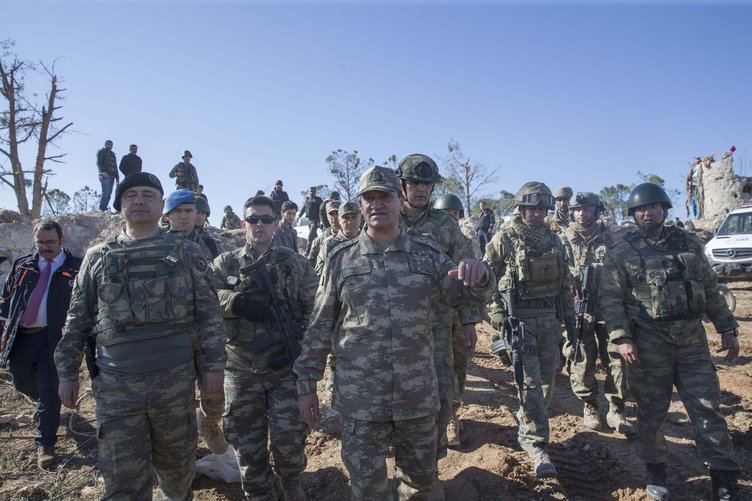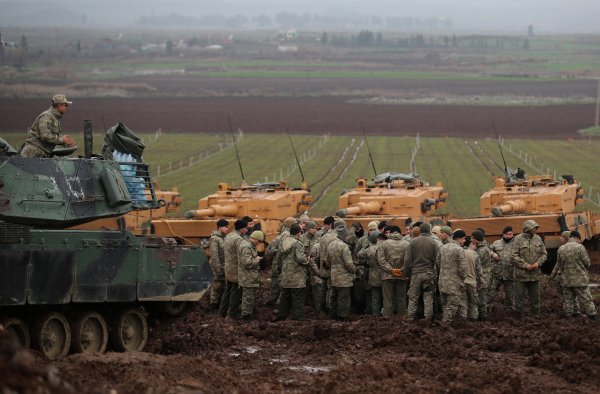After hobbled by unfavorable weather conditions and a stiff resistance by Kurdish militia fighters, Turkish forces and its rebel allies make some headways, albeit at a slow pace, in their drive toward the Kurdish enclave of Afrin in northwestern Syria.
The modest and slow nature of the military mobility forward stands in sharp contrast to frenzy and uproar that was evidently on display on the political front in Turkey.
The military said 649 militants have been neutralized, pointing to tangible results in its bid to crush People’s Protection Units (YPG), which controls the isolated town of Afrin.
“Some 649 targets of the PKK [outlawed Kurdistan Workers’ Party], KCK [Kurdistan Communities Union], PYD/YPG, and ISIS [Islamic State] terror organizations have been destroyed,” the Turkish military said in a statement on Tuesday.

Part of the reason why the Turkish forces are slowly advancing, Turkish Defense Minister Nurettin Canikli explicated, was Turkey’s great sensitivity for civilian casualties. Ankara has come under fierce international criticism for mounting civilian casualties inflicted by Turkish airstrikes and cross-border shelling of residential areas in outskirts of Afrin.
International organizations such British-based The Syrian Observatory for Human Rights put the death toll of civilians more than 50. The Turkish government, however, strictly denies any civilian casualties.
On Tuesday, a U.N. official expressed concern about the safety of over 300,000 civilians in Afrin and its districts.
Assistant Secretary-General Ursula Mueller informed the U.N. Security Council that nearly 15,000 people have been internally displaced in Afrin. His remarks came after U.N.-linked watchdog ReliefWeb reported about displaced people’s rush toward the enclave since the onset of Turkey’s military offensive.
Tthe U.N. has received reports “that local authorities inside Afrin are restricting civilian movements, particularly for those who want to leave the district,” she also added, according to Associated Press.
On Sunday, Turkish forces captured strategic Mount Burseya. Gen. Ismail Metin Temel, the Commander of the Second Army and the commander of the “Operation Olive Branch,” visited troops after the capture of the strategic hilltop.

The location overlooks Afrin and could well place the town within the reach of T-55 Firtina artillery. On Tuesday, Turkey has captured two more villages.
The Turkish army said five soldiers have been killed during the offensive. President Erdogan, however, gave a different account and said that “seven soldiers were killed.”
The rebels lost 16 fighters and more than 100 wounded, the Turkish media reported.
Tension With Allies
The Afrin offensive exposed widening rift and growing fissures between Turkey and its Western allies, most notably the U.S. which has forces on the ground in northern Syria.
The U.S. alliance with Syrian Kurdish militia adds a tangled element to Turkey’s foray, raising the specter of showdown between the two NATO allies if the Turkish forces press ahead to the east of Afrin, toward Manbij, a Kurdish-held city home to 2,000 U.S. special forces.
Mixed signals from Ankara over the duration and scope of its military objective keeps the suspense at boiler pitch. On Tuesday, Deputy Prime Minister Bekir Bozdag said “the operation concerns terrorists and terror organizations within the Afrin district,” in a deviation from the goal set by Mr. Erdogan as only the first step of a larger endeavor to clean the entire Syrian border of YPG elements.
Last week, the Turkish leader cited Manbij as next target, prompting de-escalation calls from the U.S., which genuinely concerned over the risk of a conflict between Turkish and American forces.
Undaunted by such prospect, the U.S. vowed to remain in the city. Central Command Commander Gen. Joseph Vogel told CNN on Monday that withdrawal of U.S. troops is not on the table even after the Turkish threat to attack the city.
Whether Turkey would attack the city is a matter remains to be seen in the later phases of its offensive against Afrin.




Comments are closed.